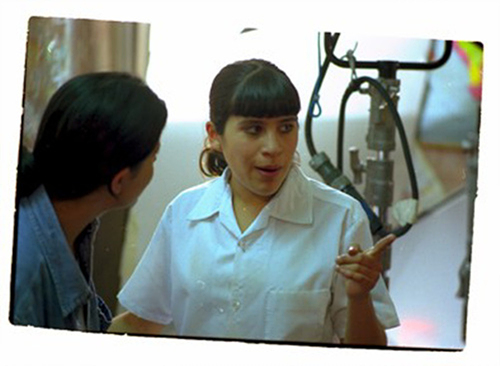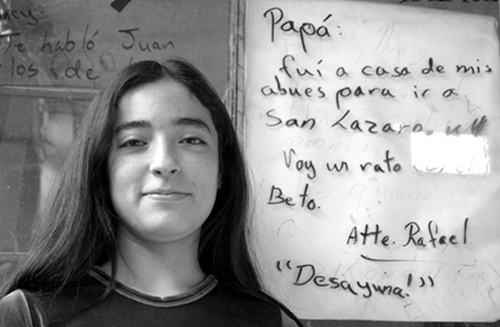4th(2002)
Perfume de Violetas: nadie te oye / Violet Perfume: Nobody Hears You
Maryse Sistach
- Mexico
- 2001
- 90min
- 35mm
- color
SYNOPSIS
Like any ordinary 15-year-old middle-schooler, Yessica is as rebellious as she is inquisitive. In public she is a tomboy who fights boys for the honor of her best friend, Miriam, but at home she is a good sister who takes care of her younger brother and a good daughter who takes care of household chores. The only thing she resists is cleaning up the mess her step-brother creates. Greed for a pair of sneakers leads Yessica’s step-brother, a bus conductor, to assist his co-worker and bus driver to rape Yessica. Although the rape leaves her devastated, Yessica refuses to report this to anyone for fear that no one, not even her family or school, will understand her.
The only comfort she finds is in her best friend, Miriam. Yessica adores the scent of violets that she smells from Miriam, as it enables her to escape from the smell of poverty and alienation that she herself reeks of. Although Miriam also leads a meager life with her mother, there is love and care within the family. But Yessica’s lack becomes a reason for Miriam’s mother to reject her daughter’s friendship with Yessica. Convinced that no one would believe her story, Yessica steals a bottle of violet-scented perfume from the store in the hope that it will conceal the smell of rape from her body. Unfortunately, this only puts Miriam on the spot.
The film’s exploration of friendship, betrayal, oppression and rebellion provide an in-depth insight into the social and institutional causes of sexual violence. Unlike films that exploit the sensationalism of graphic rape scenes, this film not only conceals this aspect but also focuses on the effects of such violence. The elaborately constructed script, unique array of colors, discreet cinematography, music that touches the senses, and economy of editing leave a lasting impression even after the film has ended. (Nam In-young)
PROGRAM NOTE
Like any ordinary 15-year-old middle-schooler, Yessica is as rebellious as she is inquisitive. In public she is a tomboy who fights boys for the honor of her best friend, Miriam, but at home she is a good sister who takes care of her younger brother and a good daughter who takes care of household chores. The only thing she resists is cleaning up the mess her step-brother creates. Greed for a pair of sneakers leads Yessica’s step-brother, a bus conductor, to assist his co-worker and bus driver to rape Yessica. Although the rape leaves her devastated, Yessica refuses to report this to anyone for fear that no one, not even her family or school, will understand her.
The only comfort she finds is in her best friend, Miriam. Yessica adores the scent of violets that she smells from Miriam, as it enables her to escape from the smell of poverty and alienation that she herself reeks of. Although Miriam also leads a meager life with her mother, there is love and care within the family. But Yessica’s lack becomes a reason for Miriam’s mother to reject her daughter’s friendship with Yessica. Convinced that no one would believe her story, Yessica steals a bottle of violet-scented perfume from the store in the hope that it will conceal the smell of rape from her body. Unfortunately, this only puts Miriam on the spot.
The film’s exploration of friendship, betrayal, oppression and rebellion provide an in-depth insight into the social and institutional causes of sexual violence. Unlike films that exploit the sensationalism of graphic rape scenes, this film not only conceals this aspect but also focuses on the effects of such violence. The elaborately constructed script, unique array of colors, discreet cinematography, music that touches the senses, and economy of editing leave a lasting impression even after the film has ended. (Nam In-young)
Director
-

Maryse SistachMaryse Sistach
Born in Mexico City, 1952. Maryse Sistach graduated with a degree in anthropology from the Sorbonne and in film from the C.C.C. in Mexico. Her graduation project, Si platicamos de agosto(1979), received an Ariel for Best Short Film, and a few years later she produced and directed the full length movie Conozco a las tres (1982). Her first feature, Los pasos de Ana(1987), was screened at Berlin in the Young Film section. In 1992 Dreaming about You won the 4th competition of experimental films, Clasicos de Mexico. She and José Buíle directed La linea paterna(1995) and the Spanish-French-Mexican co-production The Comet(1998). Violet Perfume (2000) tells a true story of adult indifference towards sexual violence against adolescents.
Credit
- ProducerJosé Buíle
- Cast Ximena Ayala, Nancy Gutíerrez, Arcelia Ram&
- Screenwriter José Buíle, based on an original wor
- Cinematography Servando Gajá
- Editor José Buíle, Huberto Hernádez
- Music Annette Fradera
- Sound Gabriela Espinoza





